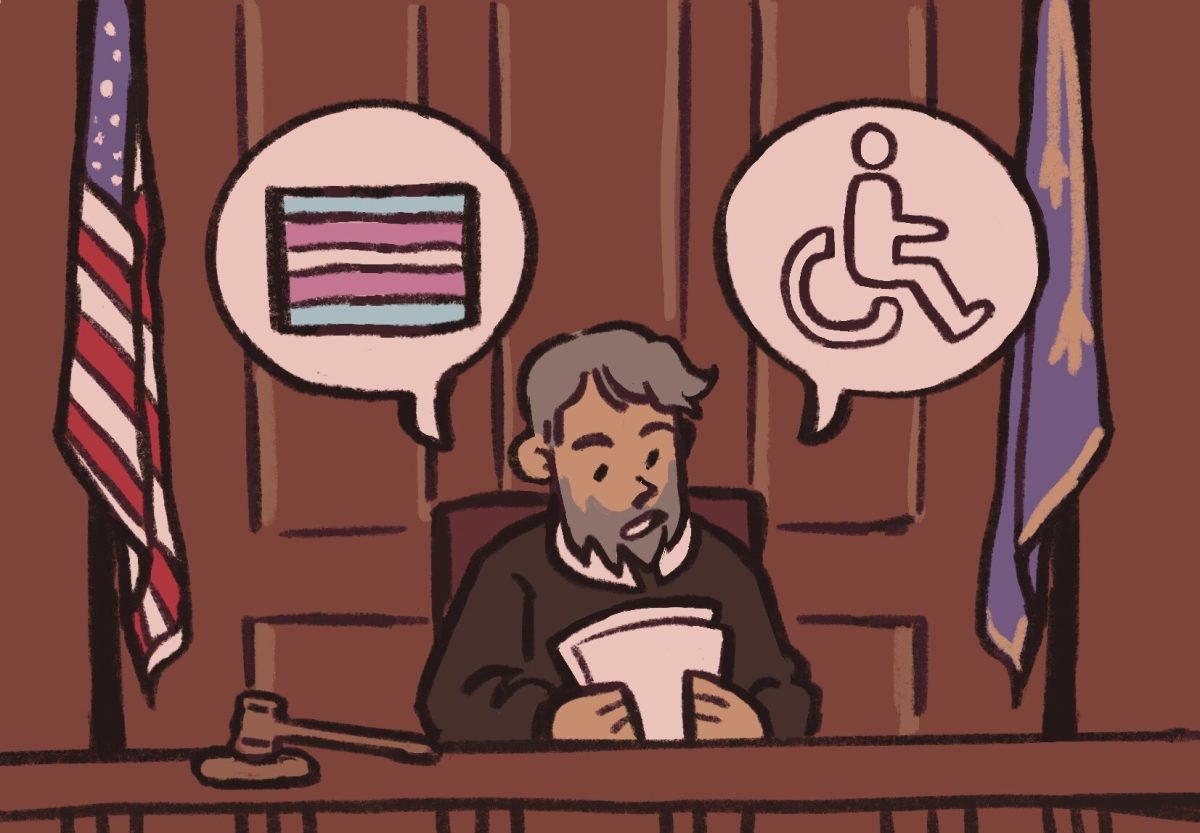Editor’s Note: The University Star attempted to reach the Texas State Department of Athletics and the university’s media relations for university comment for this column but did not receive a timely response.
Texas State is home to just about 38,000 students, all of whom come from different demographics and cultures. Undoubtedly, the LGBTQIA+ community— specifically, the transgender community — feels targeted at the hands of the lawmakers as they invalidate the legitimacy of its existence.
A person’s gender should not be tied to their successes, much less be scrutinized under the public eye and excluded under the basis of healthcare. Texas State must acknowledge these discriminatory acts and provide more support — support that surpasses ally training — for its transgender students.
Should legislation barring transgender students from competing in their respective sports be passed, transgender student-athletes at Texas State would lose their ability to compete and pursue their sports — in other words, all of their training efforts would be disregarded simply because of their gender.
In Texas, due to a bill approved by the Texas Senate, transgender athletes could be barred from competition in their respective sports. This means, for example, that a transgender girl would lose the ability to play soccer — which particularly targets female transgender athletes. With this bill in place, transgender male athletes would still be able to participate in their sports.
Marion Cahill, an anthropology senior and the interim president of Transcend at Texas State, says the majority of the debate regarding transgender athletes comes from the misconception that transgender female athletes have an unfair biological advantage due to being born with male genitalia.
“For trans athletes, I think a lot of the discourse surrounding that topic highly depends on a very skewed bio-essentialist notion that people born as men are physically more capable than people born as women,” Cahill says. “These trans bills and transphobia in general particularly target trans women.”
In addition to concern on the courts, the transgender community also faces another hefty hurdle: Healthcare. Without accessibility to gender-affirming care, the transition process for young transgender people becomes hindered, leading to more dysphoria and difficulties for transgender people as time drags on.
Suicide rates are higher among American transgender youth who are not granted the ability to transition. According to a 2019 study conducted by The Trevor Project, 35% of transgender youth admitted to attempting suicide in the last year, while another 44% seriously contemplated taking their lives.
“Trans women are constantly demonized by [cisgender] society and [are a] constant target of violence,” Cahill says. “There’s a reason why you end up seeing more trans women than trans men during Trans Day of Remembrance. It’s given rise to a term called ‘transmisogyny,’ which I and a lot of trans people are quick to adapt into our understanding of trans oppression.”
Texas State has not made sufficient efforts to be more inclusive. Although the university promotes ally training and other resources for the LGBTQIA+ community, barriers remain in place for these students.
In order for students to update their registration information and change their given name to the name they prefer, they must do so legally. This means that if they do not secure legal documentation for their name change, the student’s hard-earned diploma has their deadname on it. In order to obtain a legal name change, a fee of $150-300 must be paid. Additionally, it must be done through a court order, which can be a process that takes years.
“Overall, I feel like Texas State wants to keep an image of being progressive without actually doing anything to materially benefit us,” Cahill says. “For example, while I’ve specified that my preferred name is Marion, they’re going to be using my legal name during commencement, and I couldn’t get that changed unless I actually change my legal name.”
The Student Government body has not aided the transgender community, either. The organization initially tabled a bill aiming to adopt “transgender-friendly naming and pronoun policies,” leaving the transgender Bobcat community frustrated and without resources to rely on.
Gender should not be tied to one’s right to healthcare and freedom. By denying the transgender community treatment, validation, healthcare and basic human commodities, like participating in sports, a message of intolerance and transphobia is conveyed throughout our buildings.
Texas State must acknowledge its transgender community and offer support through this difficult time when its right to basic human healthcare, happiness and a preferred name is being debated, once again.
Although some faculty have undergone ally training to better aid the LGBTQIA+ community at Texas State, more can be done. Diversity and inclusion efforts must be promoted further, and additional resources must be extended to the marginalized group. The transgender community has faced a tumultuous year filled with statewide legislation that invalidates its rights. Training faculty to be allies of the LGBTQIA+ community is a start — but it is not enough.
– Valeria Torrealba is a public relations senior
The University Star welcomes Letters to the Editor from its readers. All submissions are reviewed and considered by the Editor-in-Chief and Opinion Editor for publication. Not all letters are guaranteed for publication.
Opinion: Texas State must support its transgender community
Valeria Torrealba, Opinion Editor
April 26, 2021
0
Donate to The University Star
Your donation will support the student journalists of Texas State University. Your contribution will allow us to purchase equipment and cover our annual website hosting costs.
More to Discover















